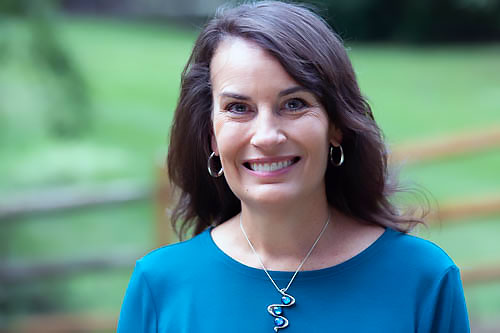Breaking the Cycle of Generational Trauma
We resume Blanche G’s family’s journey toward healing, following the sexual assault of her daughter. Once the brave sharing of survivorship is done, we must explore ways to heal the trauma the family experiences. By performing exercises, we can more mindfully break the cycle of generational trauma.
Although it can be as quick as a few minutes, a traumatic event, such as sexual abuse, has harmful ripples that extend out decades and even generations. If the deeper struggles aren’t addressed, brought to light, and healed, each survivor will pass on the proclivity for poor choices and destructive relationships to the next generation. Sadly, I know this firsthand as my family has suffered multiple generations of trauma and sexual assault. Starting with my grandmother, and cascading down to most recently, my beloved daughter, the women in my lineage have been and are survivors.
It has been said the body never forgets. This is especially true for women in a family due to the direct inheritance of mitochondrial DNA from mother to daughter. During traumatic events, the structure of one’s DNA is permanently altered. For instance, when a woman is raped, she passes genetic scars of the incident on to a future daughter. There is also the nurture component of trauma. In my family, poor choices in relationships and coping mechanisms, have become deeply ingrained. Because my grandmother modeled certain behavior to her daughter (my mother), deeper struggles weren’t addressed, brought to light, and healed. Thus, my mother modeled similar behavior, making it harder for me to identify and deal with my own struggles. This pattern prevented me from learning how to break the toxic cycle with my daughter.
By not confronting their own demons, and actively pursuing healing and wellness, my grandmother and mother perpetuated a cycle of limiting beliefs that was passed down to me by nature and by nurture. Perhaps if they did, I could have taught my daughter from childhood how to bring to light the dark places. Please explore some of the following exercises to help yourself or someone you love begin to break the cycle of generation trauma starting today.
Exercise One: Critical Reflection
If you have access to HBO Max or are willing to try a free trial, watch episode 7 of Love Life. In particular, two segments of the show point to the impact of generational trauma. Pay close attention to the explored history and relationship between the main character, Darby, and her mother, Claudia. The backstory of Claudia and the implications her conception and childhood had on both her and on Darby are powerful (time stamp 14:22). After she encounters the cops, jump forward to timestamp 23:20 and listen to the mother /daughter conversation. If you can’t watch the show, see if any points resonate with you and why.
Consider the following aspects as you watch these scenes:
· How does being the product of an unhappy home impact a child’s development to create healthy, loving relationships of all kinds?
· When a child doesn’t have healthy parental examples, how can they avoid repeating negative patterns with their future children?
· How can people create meaningful connections that balance the needs of both parties?
· How do we learn appropriate ways to send and receive love despite any lingering hurts?
· In conversation, how can we learn to share our perspective without fear of aggressive or defensive reactions?
· How might your fears of rejection be causing you to reject someone else first?
· Have society’s expectations impacted the way you relate to your children or your parents? Are you so worried that you don’t feel wanted that you can’t even see how a loved one might want more closeness with you?
· If you didn’t learn appropriate communication or relationship skills within your family due to generational trauma, how can you try new ways of connecting with people now?
· It’s never too late to start healing. What one or two small aspects you can begin working on today to break the cycle of your family’s generational trauma?
If you aren’t able to watch the show, find a place where you can be alone with your thoughts and explore the following passages:
“All of us are like stairs, one step after another, going up and going down, but all going the same way.” An Meittsu in the book, The Joy Luck Club, by Amy Tan.
Consider how we must help younger generations have a healthier, light-filled load by doing the hard work of healing ourselves. Reflect on how you can use the wisdom of your experience with generational trauma to be an active supporter in facilitating the healing of other survivors.
“The way a daughter experiences the love of her mother will forever color the lens through which she gives and receives love of all kinds.” – Love Life Season 1 Episode 7
Consider the relationship you see between the mothers and daughters in your life. Understand that daughters inherit the traumas of their mothers. This shapes how she will send and receive love in all manner of relationships. How can you take small actions today to help repair and strengthen the mother/daughter relationships in your life?
Exercise Two: Forgiveness Visualization
Forgiveness is a powerful tool. This exercise can help you forgive those who came before you for not having the strength, resources, or support necessary to conquer their inter-generational demons that they bequeathed to you. Begin by gathering some pictures of relatives who may have passed on unhealthy gifts to you (addiction, trauma, substance abuse, woundedness, limiting beliefs, etc.), and find a quiet place where you can be alone. Get comfortable. Breathe in for a count of 4 and then out for a count of 4. Do this a few times before you then allow the images of these women to fill your mind’s eye. Consider each woman’s life and experiences. Notice the traits or patterns that you might share. Look at them nonjudgmentally, as there are blessings and curses to each aspect. Tell them your feelings about these traits or patterns and listen to any response that stirs deep within you. Honor all emotions and feelings that arise. Speak forgiveness for them not taking active steps toward their healing. Be willing to see the passive steps they might have taken to protect themselves and their family. Finally, after having this pattern repeat with yourself, allow yourself to picture your daughter or daughter-figure. Be willing and able to listen to what she has to say to you about how to be a more supportive mother (figure). End the exercise with a prayer of gratitude and strength to give you the bravery to confront your challenges and to take the steps you need for recovery, healing, and hope.
You may also choose to do this exercise by writing a letter to the person (or persons) who passed on any unhealthy gifts to you. Acknowledge their positive and negative influences on your life, including the gifts they passed down to you. Express your forgiveness to them for their weakness, their inability, or their lack of initiative to heal and become healthier. End this exercise in your letter by telling them how you purpose to move forward. How by bravely confronting your challenges, you are taking your own steps toward recovery, healing, and hope. Note how you will change the patterns of negativity passed down through generational trauma by naming and claiming your voice in your own going forward story. Sign your letter and either seal it or safely burn it. Note any emotions or feelings that arise. Pay attention to your body. Are there any areas that feel lighter? Does your spirit feel more hopeful? more joy-filled?
“It was the start of seeing what (her mother) had to give rather than what (her mother) didn’t, thus unlocking a special corner of her heart.” – Love Life Season 1 Episode 7
Exercise Three: Releasing Your Baggage
Sometimes what we inherit from our parents and grandparents feels like a really heavy backpack. What in your backpack feels particularly burdensome to you? When you name something, you can claim it, and ultimately release it! Find a rock or a stone in your backyard and transform this pain into a thing of beauty by painting it. Start by writing what you inherited on both sides of the stone. Let one side represent any negative feelings you have about what you received. On the other side, write/paint something that makes you smile, or brings you joy. Knowing as you hold the rock and feel the weight of it, that you don’t have to carry it with you any longer. Lay this intergenerational burden down and smile as you feel the collective pain of you, and of all the women that carried this trait before you, begin to relax, heal and thrive.
We all receive baggage from generations past. We must choose carefully which items to keep and which to discard. Lighten our load – unpack our heavy generational backpack – leave unhealthy choices behind – move ahead with eyes fixed on health, hope, healing, and joy. Focus on the totality of the generations that came before us and accept that they did the best they could with the tools at their disposal. For better or worse, their experiences made us who we are today. It is up to us, in this present generation, to heal the brokenness and squelch the harmful self-speak that negates our value and our gifts. Let us embrace our quirks and promote faith, joy, light, love, support, health, healing, wholeness, worth, security, and purpose. Our children, especially our daughters, are depending on us to find the courage to break the cycle of generational trauma. Begin today to shine a light on darkness and pain, and nurture a culture of hope and empathy.

 Talk To Tambry
Talk To Tambry
I am glad you have taken the time to engage with this blog. Sometimes it is helpful to process new insights that emerge. If you would appreciate brief time with a someone who understands, our Talk to Tambry offering is for you. For 30 minutes, you can receive support from Tambry who is a certified life coach, spiritual director and a survivor who has been on the journey as well. This is offered at a reduced rate of $50.




